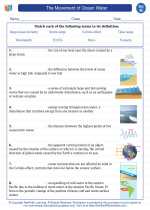Vegetables
Definition
Vegetables are edible plants or parts of plants that are consumed by humans as food. They are a rich source of vitamins, minerals, and fiber, and are an essential part of a healthy diet.
Classification of Vegetables
- Root Vegetables: Examples include carrots, potatoes, and radishes. These vegetables grow underground and are rich in carbohydrates and nutrients.
- Leafy Vegetables: Examples include spinach, lettuce, and kale. These vegetables are rich in vitamins and minerals, especially iron and calcium.
- Cruciferous Vegetables: Examples include broccoli, cauliflower, and Brussels sprouts. These vegetables are known for their cancer-fighting properties.
- Stem Vegetables: Examples include asparagus and celery. These vegetables are low in calories and high in fiber.
- Seed Vegetables: Examples include peas, corn, and beans. These vegetables are high in protein and fiber.
- Bulb Vegetables: Examples include onions and garlic. These vegetables add flavor to dishes and are known for their antimicrobial properties.
Nutritional Benefits
Vegetables are packed with essential nutrients such as vitamins (A, C, K), minerals (potassium, magnesium), and dietary fiber. They are low in calories and fat, making them an important part of a balanced diet.
Cooking and Preparation
Vegetables can be consumed raw, steamed, boiled, or roasted. It's important to avoid overcooking them to retain their nutritional value. Different cooking methods can enhance the flavor and texture of vegetables.
Health Benefits
Regular consumption of vegetables is associated with a reduced risk of chronic diseases such as heart disease, diabetes, and certain types of cancer. Their high fiber content also supports digestive health.
Study Tips
- Memorize the different types of vegetables and their nutritional benefits.
- Understand the importance of including a variety of vegetables in your diet for overall health.
- Learn different cooking methods and recipes to incorporate more vegetables into your meals.
- Be aware of the seasonal availability of different vegetables and their impact on nutrition and taste.
By understanding the diverse world of vegetables and their benefits, you can make informed choices to improve your health and well-being.
.◂Science Worksheets and Study Guides Eighth Grade. The Movement of Ocean Water

 Worksheet/Answer key
Worksheet/Answer key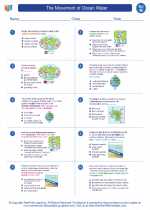
 Worksheet/Answer key
Worksheet/Answer key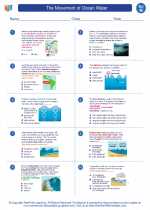
 Worksheet/Answer key
Worksheet/Answer key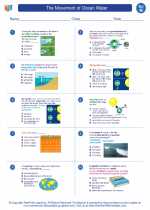
 Vocabulary/Answer key
Vocabulary/Answer key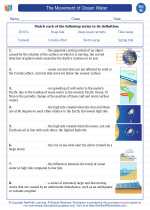
 Vocabulary/Answer key
Vocabulary/Answer key